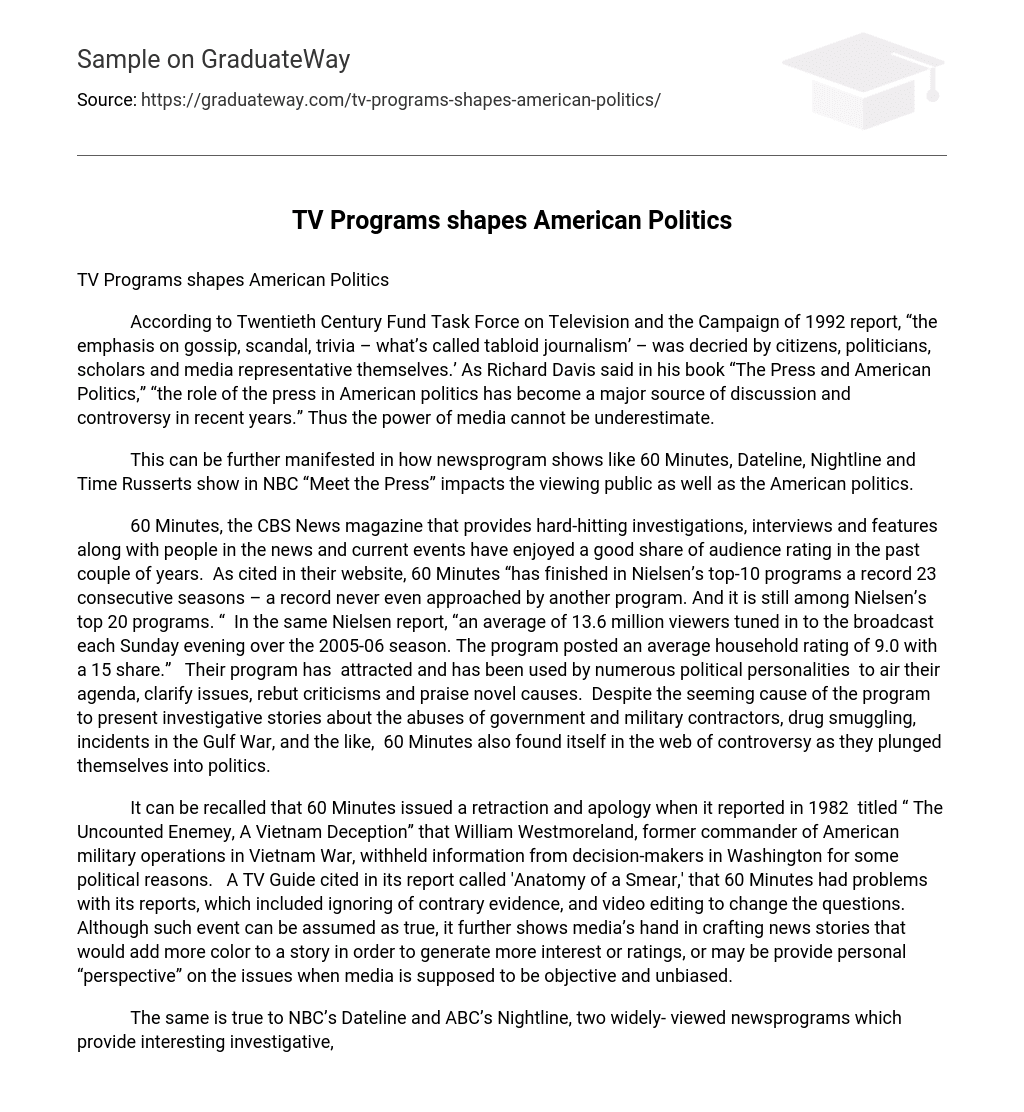According to Twentieth Century Fund Task Force on Television and the Campaign of 1992 report, “the emphasis on gossip, scandal, trivia – what’s called tabloid journalism’ – was decried by citizens, politicians, scholars and media representative themselves.’ As Richard Davis said in his book “The Press and American Politics,” “the role of the press in American politics has become a major source of discussion and controversy in recent years.” Thus the power of media cannot be underestimate.
This can be further manifested in how newsprogram shows like 60 Minutes, Dateline, Nightline and Time Russerts show in NBC “Meet the Press” impacts the viewing public as well as the American politics.
60 Minutes, the CBS News magazine that provides hard-hitting investigations, interviews and features along with people in the news and current events have enjoyed a good share of audience rating in the past couple of years. As cited in their website, 60 Minutes “has finished in Nielsen’s top-10 programs a record 23 consecutive seasons – a record never even approached by another program. And it is still among Nielsen’s top 20 programs. “ In the same Nielsen report, “an average of 13.6 million viewers tuned in to the broadcast each Sunday evening over the 2005-06 season. The program posted an average household rating of 9.0 with a 15 share.” Their program has attracted and has been used by numerous political personalities to air their agenda, clarify issues, rebut criticisms and praise novel causes. Despite the seeming cause of the program to present investigative stories about the abuses of government and military contractors, drug smuggling, incidents in the Gulf War, and the like, 60 Minutes also found itself in the web of controversy as they plunged themselves into politics.
It can be recalled that 60 Minutes issued a retraction and apology when it reported in 1982 titled “ The Uncounted Enemey, A Vietnam Deception” that William Westmoreland, former commander of American military operations in Vietnam War, withheld information from decision-makers in Washington for some political reasons. A TV Guide cited in its report called ‘Anatomy of a Smear,’ that 60 Minutes had problems with its reports, which included ignoring of contrary evidence, and video editing to change the questions. Although such event can be assumed as true, it further shows media’s hand in crafting news stories that would add more color to a story in order to generate more interest or ratings, or may be provide personal “perspective” on the issues when media is supposed to be objective and unbiased.
The same is true to NBC’s Dateline and ABC’s Nightline, two widely- viewed newsprograms which provide interesting investigative, in-depth political and other stories to the public. Both programs examines a major issues unfolding in America or the world and presents interesting political issues that may invite criticism or applause. Although it must be noted that despite the supposed objective and unbiased treatment of newsanchors of these programs, it cannot be helped to assume that their personal advocacies get way into the facts of the stories.
This may be the case with Tim Russert of the show “Meet the Press.” In said program, Russert interviews America’s hot and intriguing policymnakers, journalists and others and provides in-depth discussion on politics, entertainment and the media. Despite the seeming interest to draw and dig deeper into the minds of his guests, it cannot be assumed that this simply intended for the shows or for creating “news.” There may be other reasons involve that could possibly influence how the public views a certain political personality or certain situations. And no matter how they remain true to the calling of their profession, news personalities would always drag into the limelight of politics. This may be true when Russert was dragged into the Central Intelligence Agency (CIA) leak scandal. He was called into court testify that he did not tell Scott Libby, chief of staff for Vice-President Dick Cheney of the identify of CIA agent Valerie Plame (Mrs. Joseph C. Wilson). In the said trial, another witness, former Cheney communications director Cathie Martin, testified that she “suggested we put the vice president on ‘Meet the Press,'” hosted by Russert on NBC, and that it was “a tactic we often used….It’s our best format.”
The involvement of news personalities in political issues sometimes delineates the line between media’s role particularly in politics. Further, it proves true that reporters and news editors are powerful political actors – that they do play key roles in setting American political agenda by determining what news is to be covered, how much and in what context. The manner by which news personalities give their opinions about politics in large tubes may be deemed as a form of interpreting news for its target public. The media’s interpretation of stories that usually involve government hypocrisy and corruption.
Moreover, the media’s interest to sensationalize political stories may be attributed to the politicizing of news. They provide disproportionate coverage to events like war, violence, conflict, corruption and other scandalous events on the personal lives of politicians to generate more advertisements and high viewership. Despite such politiicization of news, media programs like 60 Minutes, Dateline, Nightline and Tim Russert’s “Meet the Pres” signify media’s role as watchdog of the public when it comes to political issues.
However, recent studies assert that media are seen to have less impact in changing existing opinion or in changing political behavior. In an essay cited in media and politics page in the Internet, the seemingly less impact of media in changing attitude of its viewers may be attributed to the idea that some identified media as the source of frustration since media focused too much on “character’ issues, scandals and polls rather than real issues that concerns the economy and governance most important to the public.





